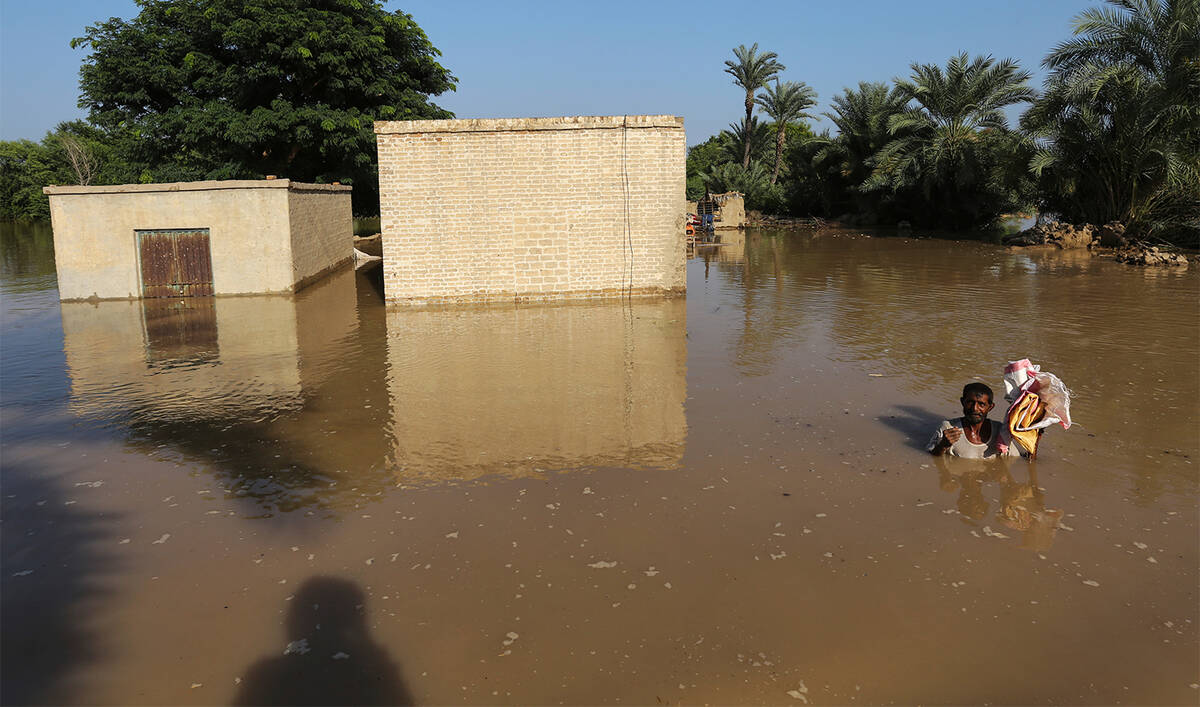KARACHI: Sindh’s disaster authority said on Wednesday more than 300 people were rescued in Pakistan’s commercial capital Karachi after heavy rains lashed the city for several hours, inundating low-lying areas and forcing schools to shut, as a local charity reported at least two people drowned after being swept into a stream.
The Pakistan Meteorological Department warned of a new spell of rains in southern Sindh and neighboring Balochistan provinces this week, with risks of severe urban flooding in Karachi, Hyderabad and Sukkur as well as flash floods in mountain catchments.
Torrential downpours submerged parts of Karachi late Tuesday, as authorities in Sindh were already bracing for looming “super floods” along the Indus River after weeks of record monsoon rains across Punjab, the country’s agricultural heartland, sent massive torrents downstream.
Millions were displaced in Punjab after three major eastern rivers — Chenab, Ravi and Sutlej — surged following water releases from Indian dams amid New Delhi’s efforts to ease pressure on swollen reservoirs.
“The populations living along the Lyari and Malir rivers have been the worst affected by the rains,” Sindh Provincial Disaster Management Authority (PDMA) Director General Salman Shah said. “So far, 325 people have been rescued. Nine PDMA teams and 50 Rescue 1122 personnel were on standby, and about 400 workers are currently engaged in rescue operations.”
Karachi’s mayor, Murtaza Wahab, toured affected areas during the night and said in the early hours of Wednesday that all major arteries and underpasses were clear for traffic. He cautioned that drizzle was still continuing and urged residents to remain safe during the inclement weather.
The Karachi commissioner’s office announced late Tuesday a holiday for all public and private educational institutions across the division, citing forecasts of more heavy rain.
Edhi Foundation said its rescue teams pulled bodies from a stream in the city after a van was washed away, while searches continued for more missing passengers. The charity identified the victims as a 45-year-old man and a 60-year-old woman.
Sindh Information Minister Sharjeel Inam Memon also said during the day large-scale rescue and relief operations were under way following the rains and rising river levels.
“The situation in Karachi is gradually improving,” he said, adding that overflowing in Lyari and Malir rivers and high sea tides had slowed the drainage of rainwater.
Memon warned of another spell of rain in the city in the next 24 to 48 hours but noted conditions would normalize quickly if fresh downpours did not occur.
MORE RAINS EXPECTED
Meanwhile, the National Emergencies Operation Center of the National Disaster Management Authority (NDMA) issued a flood alert for Sindh and Balochistan, warning of widespread rain and thunderstorms in Karachi, Hyderabad, Jamshoro, Thatta, Badin, Sujawal, Tharparkar, Umerkot, Sanghar, Dadu, Jacobabad and other districts.
It noted that low-lying urban areas were at risk of submergence, with traffic flows likely to be disrupted.
Heavy rain was also forecast for Sukkur, Rohri, Larkana, Shikarpur, Ghotki and Kashmore, while downpours in the Kirthar mountain range could trigger hill torrents.
In Balochistan, heavy rainfall was expected over the next 24 hours in Lasbela, Hub, Khuzdar, Awaran, Barkhan, Sui, Sibi, Dera Bugti, Naseerabad, Kohlu, Kalat and Zhob. Further rain was forecast in Kech, Gwadar,
Pasni, Ormara, Surab and southern Washuk, with flash floods feared in Wadh, Khuzdar, Bela, Ormara and Hingol valley.
The NDMA urged the public to avoid unnecessary travel, keep vehicles parked in safe areas, and stay clear of submerged roads and underpasses.
RIVER SITUATION
According to an update by the Punjab PDMA at 11:30 a.m. Wednesday, river flows in Punjab remained high, with significant pressure points downstream.
On the Chenab, flows at Trimmu headworks near Jhang stood at 250,005 cusecs and steady, while gauges at Sher Shah Bridge near Multan showed water levels holding steady at 393.40 feet.
The Sutlej carried some of the heaviest volumes, with nearly 196,000 cusecs at Ganda Singh Wala near Kasur and more than 530,000 cusecs at Punjnad headworks, where operational capacity was reported reduced due to backwater effects from the Indus.
Downstream in Sindh, the Guddu Barrage was handling more than 502,000 cusecs, underscoring the threat of flooding as Indus waters surged south.
The provincial information minister of Sindh said 4,881 people had been evacuated from the riverine areas in the last 24 hours, bringing the total number of people relocated in the recent days to 146,492.
He said 5,296 people had received medical assistance in the past day through 163 fixed and mobile health centers, raising the cumulative total to 55,336.
Memon added that 11,078 livestock had also been moved to safety in the past 24 hours, with the total reaching 400,018.
Veterinary teams had vaccinated or treated more than 58,000 animals in a day, pushing the cumulative figure past one million.

















